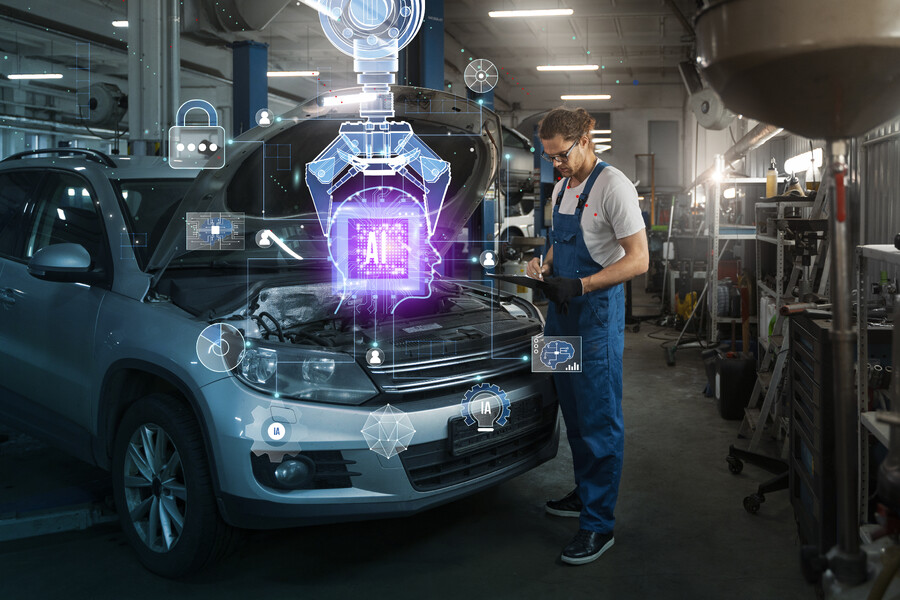
As we stand at the crossroads of technological advancements, the integration of Artificial Intelligence (AI) into autonomous vehicles is reshaping the way we perceive and interact with automobiles. This article delves into the transformative impact of AI on both autonomous cars and the dealership experience, highlighting the symbiotic relationship between the two.
Autonomous vehicles, often referred to as self-driving cars, are becoming increasingly prevalent in today’s automotive landscape. The integration of Artificial Intelligence (AI) into these vehicles is the driving force behind their capabilities. With companies like Tesla, Waymo, and Uber investing heavily in this technology, the future of transportation is here. At the heart of this revolution is AI.
Sensory Perception: AI algorithms process data from cameras, radars, and sensors to understand the vehicle’s surroundings. This enables the car to make split-second decisions, ensuring safety and efficiency.
Predictive Analysis: By analyzing vast amounts of data, AI can predict potential hazards, traffic patterns, and even the behavior of pedestrians and other drivers.
Continuous Learning: One of the most significant advantages of AI is its ability to learn. As more autonomous vehicles hit the roads, they share their experiences, refining algorithms and enhancing safety.
2. Dealerships: The New Age Experience
While autonomous cars are making headlines, dealerships are undergoing a quiet transformation. AI is revolutionizing the way dealerships operate and interact with customers.
Personalized Customer Experience: Dealerships are leveraging AI to analyze customer data, offering personalized recommendations based on preferences, driving habits, and purchase history.
Inventory Management: AI-driven tools help dealerships predict which models and features will be in demand, optimizing inventory and reducing overhead costs.
Virtual Showrooms: Augmented Reality (AR) and Virtual Reality (VR) powered by AI are creating immersive virtual showrooms, allowing customers to experience cars without stepping into a physical dealership.
As autonomous vehicles become mainstream, dealerships might need to shift from selling cars to offering mobility services. They will need to invest in training their staff about the intricacies of AI and autonomous technology. Additionally, they might offer software upgrades as a part of their service.
Dealers will need to educate customers about the benefits and functionalities of autonomous vehicles, shifting from a traditional sales pitch to a more informative approach.
The integration of AI in both autonomous cars and dealerships creates a feedback loop. As autonomous vehicles collect data, it can be shared with dealerships to refine customer experiences. Conversely, dealerships can provide feedback to manufacturers, leading to improvements in autonomous vehicle technology.
Predictive Maintenance: AI can predict when a car needs maintenance, allowing dealerships to notify customers proactively. This not only enhances vehicle longevity but also boosts customer trust.
Chatbots and Virtual Assistants: For queries, bookings, or complaints, AI-driven chatbots can provide instant responses, improving customer interaction and satisfaction.
Feedback Analysis: AI can analyze customer feedback to identify areas of improvement, ensuring that dealerships continually refine their service offerings.
Advanced Diagnostics: With AI, dealerships can run advanced diagnostic tests on autonomous vehicles, identifying potential issues before they become major problems.
Training: As cars become more technologically advanced, mechanics and technicians will require training in AI and related technologies. This ensures they’re equipped to handle the complexities of autonomous vehicles.
Remote Fixes: Some issues in autonomous cars might be software-related. AI can help in remotely diagnosing and fixing certain problems without the vehicle needing to be physically present at the dealership.
Inventory Management:
Demand Prediction: AI can analyze market trends, local preferences, and other data to predict which car models are likely to be in demand. This helps dealerships manage their inventory more efficiently.
In the future, autonomous vehicles powered by AI will integrate seamlessly with smart city infrastructures, optimizing traffic flow and reducing congestion.
Traditional car manufacturers are increasingly collaborating with tech giants to enhance their AI capabilities and bring more advanced autonomous vehicles to the market.
While the potential of AI in the automotive sector is immense, challenges remain. Concerns about data privacy, the need for standardized regulations, and the initial high costs are hurdles that need to be addressed. However, with continuous innovation and collaboration between stakeholders, the future looks promising.
AI is not just a buzzword in the automobile industry; it’s a transformative tool that’s reshaping the core product, operations, marketing, customer service, and more.
Cognitgo’s ROboT is one such example where the AI powered application empowers the dealers to cultivate a rich pipeline of buyback leads by analyzing every single service-drive customer and identifying hand-raisers by engaging via text with high-intent customers. This can help dealers to build an inventory which includes in-demand vehicles while procuring them at attractive rates.
The intersection of AI, autonomous cars, and dealerships is not just about technology; it’s about enhancing the human experience. It’s clear that AI will play a pivotal role in shaping the future of transportation and the way we engage with automobiles.
